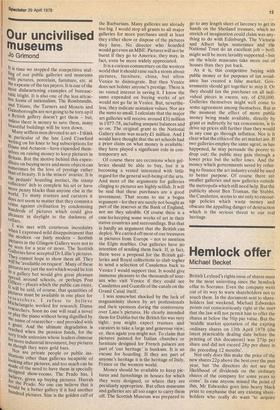Hemlock offer
Michael Becket
British Leyland's rights issue of shares must be the most uninviting since the hemlock offer to Socrates. Even the company went out of its way to warn shareholders not to touch them. In the document sent to shareholders last weekend, Michael Edwardes points out conscientiously right at the start that the law will not permit him to offer the shares at below the 50p par value. But the 'middle market quotation of the existing ordinary shares on 13th April 1978 (the latest practicable dealing date before the printing of this document) was 270 per share and did not exceed 28p per share in the preceding 12 months'.
Not only does this make the price of the new shares 22p above the best over the past year, but 'the directors do not see the likelihood of dividends on the ordinary shares of the company for some years to come'. In case anyone missed the point of this, Mr Edwardes goes into heavy black print to emphasise that any existing shareholders who really do want 'to acquire further ordinary shares are likely to be able to buy them in the market at materially less than 50p per share' at which they are have being offered. `Accordingly, the directors would not expect or recommend you to subscribe for any of the new ordinary shares
, and the directors themselves do not intend to do so.' The directors between them , actually own 4,450 shares, worth on this
valuation something less than £1,250. And that, it would seem, is the full amount they are prepared to commit to British Leyland.
This is hardly surprising, since Mr Edwardes continues with scrupulous gloom that 'the lack of profitability in 1977 has
caused the directors to review and revise the company's future plans'. The figures are ' also there. Last year the company sold
'-785,000 vehicles against the 981,000 of 4976; it made a pre-tax profit of £3.1
' million compared with the previous period's £70.5 million; and after tax and ' `extraordinary items' (including part of the cost of closing the Speke plant at Liverpool)
it made a loss of £51.9 million against a
profit of £44.2 million in 1976. One of the . results has been to cut £300 million off the investment in new cars. Mr Edwardes adds
'that the company has short term debts such
• as overdrafts of £340 million and it owes tt275 million to the National Enterprise ' Board, its major shareh9lder. He does not
• include the most recent estimates that British Leyland may have less than 20 per cent of the UK car market in April, compared with the 42.5 per cent held by the individual companies which were merged.
But the letter to shareholders lapses into heavy print a second time: `You are urged not to apply for the new ordinary shares without first taking professional advice. 'Subscription for the new ordinary shares at • .50p is likely to result in financial disadvantage.' Not surprisingly `the directors expect few, if any, persons to be willing to subscribe for new ordinary shares at 50p a ,share', considering 'the warnings given above'.
How can anyone resist an invitation like that? Quite apart from the bizarre letter, it ' is costing an inexcusable £4.6 million of
• badly needed cash for British Leyland to • make this £490 million offer; presumably • most of that will go to the National Enter • prise Board which is underwriting the issue.
' Normally such costs are paid to underwriters to cover the cost of processing
applications and to ensure them against the • risk of being left with the issue on their hands. But that is the second curious aspect of this. Clearly it wasintended rightfrom the
• start that the NEB should add the shares to its existing 95 per cent stake. The question that remains, then, is
what on earth does the NEB think it is doing frittering our money on shares which on the chairman's own evidence are at best ludicr ously overpriced and at worst downright Worthless? A single crumb of comfort cr Optimistic syllable might have helped, but Mr Edwardes, for once, has presented the truth.



































 Previous page
Previous page